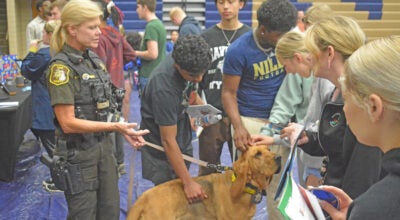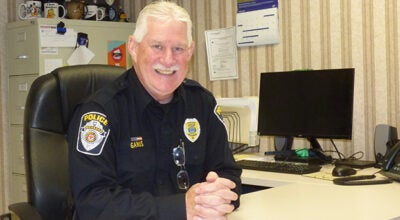Cancer or not? Is there a choice?
Published 9:38 pm Wednesday, August 11, 2010

Dr. Robin Zon, Michiana Hematology-Oncology, in Dowagiac Wednesday for the second annual Coins for Cass County Cancer Service soup and salad luncheon at Elks Lodge 889. (The Daily News/John Eby)
By JOHN EBY
Dowagiac Daily News
This year in the United States 1,529,560 people will be diagnosed with cancer.
That’s one in every three Americans.
“It’s a rather high statistic,” Dr. Robin Zon told the second annual Coins for Cass County Cancer Service soup and salad luncheon Wednesday noon at Dowagiac Elks Lodge 889.
“About a third of those folks will die from cancer. In round numbers, that’s 1,500 people a day,” compared to 81 million with heart disease, of whom 831,272 will die.
“Much less than 10 percent. We do a much better job of taking care of people with cardio-vascular disease than we do those with cancer. That’s why prevention is so important.”
Dr. Zon, whose mother died seven years ago from esophageal cancer despite no risk factors, conveyed the message that “cancer doesn’t have to be deadly” with medical advances.
U.S. cancer survivors number 11 million.
“The survival rate for all cancers is up quite a bit,” she said. “In the 1970s, the survival rate was 50 percent. Half the people who got cancer died.”
Today, that figure has improved to 68 percent.
Detected in early stages, breast cancer, basal cells skin cancer and colon cancer enjoy survival rates of 90 percent to 100 percent.
“Even better news,” Dr. Zon said, is that cancer is preventable by making sound lifestyle choices.
A third of all cancers are related to tobacco exposure. Using tobacco can cause 15 different kinds of cancer.
Heavy use of alcohol, obesity, inadequate physical activity or nutrition, account for another third of cancers.
Dr. Zon, originally from Rochester, N.Y., has been in this area almost 13 years.
She attended the University of Detroit in the 1970s, then was in Indianapolis.
“Two weeks from now I’m going to start serving the community of Niles.”
With a background in chemistry, she did chemical and diagnostic research for the pharmaceutical industry before becoming an oncologist.
“I have a very strong interest in doing clinical research,” Dr. Zon said. “Locally, the Lakeland Health Care System is involved in the Northern Indiana Cancer Research Consortium (NICRC, or nicrc.org) comprised of several hospitals. We have a grant from NCI, actually. We’re considered one of the top 10 research facilities in a community setting across the country, and I lead that.”
Still, there are those who eat well, stay fit and trim, exercise and go to church and still get cancer.
“Cancer can be caused by infection,” Dr. Zon said, mentioning hepatitis B (liver cancer), the human papilloma virus (cervical cancer in females, but also head and neck cancer in both men and women), helicobacter pylori (stomach cancer) and human immunodeficiency virus, or HIV (lymphoma).
Cancer can be caused by natural elements seen and enjoyed daily, such as the sun.
A million skin cancers will be diagnosed on top of the 1.5 million other cases.
“For some reason, they don’t count skin cancers because usually they’re cured by removal, though melanoma’s pretty dangerous,” Dr. Zon said. “The good news is that 100-percent of these skin cancers can be prevented by wearing some sort of protection when you’re out in the sun or driving the car — and avoiding tanning booths.”
Genetics factor in, too.
“You can inherit cancer from your parents,” she said, “but it’s not a done deal. Just because there may be a genetic defect in your family doesn’t mean you will get cancer. You need to know your family history to determine what your risk is” because 30 years ago nobody talked about cancer.
“Genetic counseling” is even an option, Dr. Zon said of an interview process.
“If you have the gene, even if you don’t get cancer, there may be an increased risk of getting cancer,” she said.
“There are screening tests you should undergo that may be different from the neighbor next door who doesn’t have a gene for cancer. For women, they may have to get mammograms earlier. Some families have lots of polyps in their colons. Colon cancer is easily preventable by colonoscopy. Medicare, which is a very frugal health care system, almost, but not quite, mandates colonoscopies when you turn 55. They think it’s that important that they’ll pay for it. There’s now an FDA-approved pill to prevent the change of a polyp into colon cancer. Having ovaries removed can take away the risk for ovarian cancer. The point is, you need to keep your family informed and your physician so they can better inform you of anything pro-active you can do. Cervical cancer can be detected from a pap test. Mammograms can’t prevent cancer, but it’s a way to detect pre-cancerous spots which can be taken out. It’s very highly curable in early stages.”
Survivors risk developing “a second, third or fourth” type of cancer, she said.
“Surprisingly, there are a significant number of people — up to 50 percent — who never go back to the doctor, so we’re not able to detect early changes that would suggest they’re on the road to getting cancer. We can’t intervene and prevent that, so we really emphasize to cancer survivors and their family members to stop smoking and totally eliminate your tobacco exposure, exercise — the most underutilized way we can prevent cancer in this country — eating a heart-healthy diet — plant-based with lots of fruit and vegetables, lean meat, no fast food whatsoever, avoiding carbonated drinks, reducing sugar and salt intake, wear sunscreen, don’t avoid seeing a doctor regularly and know family histories.”
Dr. Zon advocates at least three hours a week of vigorous movement, which can reduce cancer occurrences by half.
Survivors can cut chances of a recurrence by 40 percent working out.
She said women can consume six alcohol drinks a week, men 14.
“That’s a lot of alcohol if you’re not a drinker like myself,” she added.
Cancer “is not always a death sentence” anymore, Dr. Zon said. “If caught early, the odds are great. We do a good job on breast cancer (98 percent cure rate), kidney (90 percent), ovarian (94 percent), testis, common in young men ages 15 to 22 (99 percent), cervical (92 percent), colon/rectal (91 percent), melanoma (98 percent), prostate/thyroid (100 percent) and uterine (96 percent).
“These are cancers that in the past people automatically died from,” she said. “Not anymore.”
Her mentor at Indiana University developed the cure for testis cancer.
“We saw patients from all over the world who all walked out the door cured,” she said. “I always consider Lance Armstrong. He may not be considered our star when it comes to bicycle racing right now, but he is our star when it comes to oncology. I was at IU when he came in and had the opportunity to care for him.
“With new treatments for breast cancer, I have many women where the disease has spread outside the breasts and lymph nodes to other organs who are 10 years out. Some of them are completely cured and not on any therapy. They’re living full lives. They’re raising their children, working and doing whatever’s important to them.
“Colon and lung cancer used to have a six-month survival. Now it’s three to five years, which is still too short, in my opinion, which is why we’re working hard to improve on that. Even in the last decade it went from six months to three to five years, which tells you about the power of what we can do to help individuals, all based on research. I couldn’t show you these numbers 10 years ago, and certainly not 30 years ago, when nobody talked about cancer. It was hidden from the family.
“You need to be talking about it and telling each other what’s going on so we can help each other and ourselves. You don’t have to die from cancer. You can actually prevent cancer.”
Secretary Maxine Ownby, who became a volunteer after surviving breast cancer diagnosed in 2008, announced the four-person scramble golf outing June 19 at Four Lakes Country Club in Edwardsburg turned a $6,789 profit.
The Cancer Service will be selling ice cream and water at the Rod and Roll car show in downtown Dowagiac Aug. 21 and hot chocolate at the Christmas parade Dec. 3.
The Cancer Service has three meetings a year, working out of volunteers’ homes the rest of the time. Volunteers are especially needed in the Marcellus and Cassopolis areas. For more information, call President Linda Minnix of Union at (269) 641-7200.
All services are provided free of charge and include use of medical equipment such as wheelchairs, walkers, bedside commodes, crutches and canes.
If financially able, it assists patients with obtaining prescriptions, medical supplies and meeting other needs which may exist, such as gas cards for transportation to appointments. They also supply wigs.
The organization expects to spend $16,525 in 2010.
Cass County Cancer Service, established in 1991 and not affiliated in any way with the American Cancer Society, is based in Edwardsburg (P.O. Box 676, 49112) and can be contacted at (269) 699-5551.






